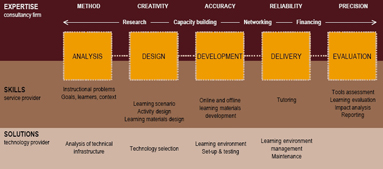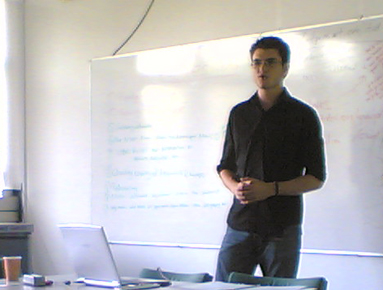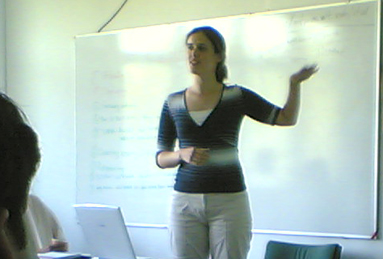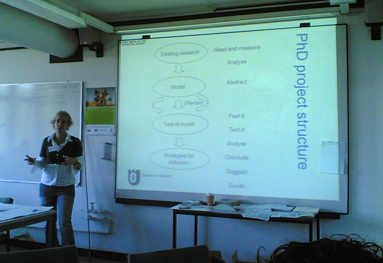By Ismael Peña-López (@ictlogist), 20 September 2006
Main categories: Education & e-Learning, ICT4D, Knowledge Management
No Comments »
Seed is a new non-profit created to foster the use of ICTs in education in cooperation and development projects. In my oppinion, the added value comes in their approach: to help in the design of ICT strategies, instead of (a) taking for granted that the project or the institution’s strategy is ok or (b) taking for granted that the western point of view of ICT strategy is the one and only, and counterparts just have to accept charity (no help, no contributions, no collaboration at all, just charity) without complaining.

Seed services [click to enlarge]
One of the members of the team is Isabella Rega, whom ICTlogy readers might already be familiar with, for she took part in the Annual ICT4D Postgraduate Symposium 2006.
By Ismael Peña-López (@ictlogist), 19 September 2006
Main categories: ICT4D
No Comments »
New ITU report on the history, state and trends of ICT development in least developed countries.
Main report conclusions:
- Teledensity has doubled (even multipliyed per 20).
- Connectivity goes mobile and cellulars increase prominence. Wireless can boost too the increase in connectivity and teledensity.
- Access and interest (i.e. e-education, e-health, e-business, e-agriculture, and e-government) in the Internet increases. ICTs look like the last train to development.
- Lack or weak policy making and regulating in the ICT arena.
- Still high cost of connectivity.
- Lack of local relevant content.
Main comments (on my side):
- What teledensity? low or broadband? It seems it’s just “lines”. But, are these “lines” worth the name of connectivity when the world goes broadband demanding?
- It seems like (for the first time, at least being I aware of this) ITU is focusing new strategies not only to infrastructures development but also to e-services, which is definitely good news.
- Same with regulation. On the other side, I wonder this will mean free market at whatever price. I wonder if mixed formulae (public ownership of infrastrucures, free market for apps and services) will be considered: there are many examples where private ownerwship of infrastructure has lead to (a) de facto monopolies and/or (b) sub-optimal investment in infrastructures.
- It looks like is trendy and hypy to talk about ICTs for disaster prevention (just remember Katrina and Indonesia tsunami), but it is still not that trendy to talk about ICT for capacitation, human capital, self-entrepreneurship and other endogenous development concepts.
- No mention to free software (infrastructure) or open access (content) paradigms. I just cannot believe it. Completely astonished.
The report:
[via Telconomics, ITU and i4d]
By Ismael Peña-López (@ictlogist), 15 September 2006
Main categories: ICT4D, Meetings
Other tags: ict4d_symposium_2006
No Comments »
This is the Annual ICT4D Postgraduate Symposium closing plenary briefing. It took place in Egham, September 15th, 2006, evening. Here come the notes I took on the fly:
First of all, I was given the chance to present ICTlogy as my personal reseach portal in the field of ICT4D. Hope it was found useful for people to benefit from my previous (re)searches. I really encouraged people to contribute (are you reading this? ;)
Following, some of the attendants (representing working groups) presented the “solutions” these groups gave to some “frequenly asked questions” by researchers and PhD students, namely:
- Where to get the funding for field work
- How to survive the “downs”
- How to sustain enthusiasm
- How to keep balance among private life (family, social relationships… life, all in all) and research
- What are the “cyber-policies” and distribution of wealth, resources, etc.
- How to chose a country of fieldwork and sample
- How to find references and how to do the referencing
- What should be the student-supervisor relationship like during the “journey”
- What are the (best) tools to manage your bibliography (and which are FLOSS)
Then Tim Unwin presented some “Concluding Thoughts”.
Among the main commitments for the future, here come some:
- Do be part of / use the SPIDER/PID network, as one means to keep in touch
- There’ll be a Moodle-based discussion forum
- A supportive environment for successful PhD research should be created
- Ways to use environments, contributing to the journals and sites (ITID, KM4Dev, ICTlogy)
- Collaborative, shared peer-learning, pro bono activities, publication in relevant outlets, practical interest, outward looking relevant, critical but supportive
- And of course, keeping in mind the latest goal: development!
Next appointments:
- CDE/ICT4D meeting in London on 10th October (Knowledge Lab)
- November 23rd Cisco-ICT4D lecture, 18:00, Royal Holloway
- Next year’s Symposium
- Collective Book Project: ICT4D Series, edited by Tim Unwin
And of course all the presentations will be uploaded to the ICT4D Collective web page. Stay tuned!
Sincerest, heartly thanks to Tim, Marije, Auch, David. Many many thanks!!
First Annual ICT4D Postgraduate Symposium (2006)
By Ismael Peña-López (@ictlogist), 15 September 2006
Main categories: ICT4D, Meetings
Other tags: ict4d_symposium_2006
No Comments »
This is the Annual ICT4D Postgraduate Symposium eight and last session briefing. It took place in Egham, September 15th, 2006, evening. Here come the notes I took on the fly:
David Hollow, Royal Holloway University of London
The challenges in providing effective primary education in Zambia through Interactive Radio Instruction
Interactive Radio Instruction differs from traditional distance education — the primary goal is the improvement of educational quality. It is, indeed, a more constructivist model.
Learning at the Taonga Market (LTM) started by Ministry of Education of Zambia, consisting of 30 minute broadcasts.
The Freeplay Foundation designed the Lifeline Radio for the humanitarian sector, a radio that works with solar energy or can be powered manually through a lever.
Challenges:
- Providing financial suport por mentors
- Ensuring quality of mentors
- Using locally appropriate language and content
- The decentralised system of education
- Consistency and commitment of the Ministry of Education
- Availability of funds
- Differing ideologies

David Hollow
Salma Abbasi, Royal Holloway University of London
Practical ways to deploy and sustain ICT to enable development and gender empowerment. Preliminary field observations of ICTs.
Gives some examples of “Kachi Abadi” in Pakistan and their PCOs (Personal Call Offices).
Problem statement: “Technology is not for girls”.
She’s developed a handbook of the different models of telecenters (e-Choupal, Akshaya e-Kendras, e Seva, Cabinas Públicas, Telecottages, Gaseleka Telecenter, etc.) and she’s listed the services offered in each type of telecenter (Agriculture community access, training center, information kiosk, e-transaction, e-governance cell, etc.)
Having this categorization in mind, what happens with Women and ICT Centers? What’s the impact on women:
- women empowerment
- income generation
- social respect for women
- skills development [she especially stresses this point]
- awareness [of the power of ICTs] building
An urgent need to have:
- integrated policies
- multi-stake holder environment
- localization of ICTs for the environment and culture
- use existing infrastructure
Marcus Duveskog, University of Joensuu
Cultural Encounters in Teacher Training Programmes in Tanzania
Dealing how to use technologyh to improve ICT education and HIV/AIDS education/counseling in Tanzania and soon also in South Africa. Challenge: How can we contextualize ICT education and technology so the local community can fully take advantage of its opportunities and possibilities.
Main problems:
- people not being “on the wave” of new technologies (“too old to learn”, “don’t need no training at my age”)
- not being motivated for learning (but payed to, so they could make their living while attending classes)
- legitimacy of the trainer and him knowing cultural proceedings
- legitimacy of the computer itself (“computer = Mzungu [white man]”): technology might not be at all a neutral platform
- Cultural traditions, customs
- Drought and electricity problems
- Corruption
First Annual ICT4D Postgraduate Symposium (2006)
By Ismael Peña-López (@ictlogist), 15 September 2006
Main categories: ICT4D, Meetings
Other tags: ict4d_symposium_2006
No Comments »
This is the Annual ICT4D Postgraduate Symposium seventh session briefing. It took place in Egham, September 15th, 2006, afternoon. Here come the notes I took on the fly:
Gudrun Wicander, Karlstad University
The PhD Student Network in ICT for Developing Regions
[disclaimer: actually not a PhD research, but an ongoing project]
Just before starting the presentations, Gudrun presents The PhD Student Network in ICT for Developing Regions, also PID network. The network was created by Gudrun Wicandi herself and Annika Andersson, to foster networking among doctoral (and master) students in the field of ICT4D.
Once the network is set, a plan of activities will be launched to this community can share articles or pre-prints, meet, etc.
Marije Geldof, Royal Holloway University of London
The role of ICT in empowering people with low-literacy levels in Africa
What’s the meaning of being literate today? There even is an agreement on how to measure literacy at all (digital or not).
The existence of means of communication creates a demand for them. The instruments of literacy create a demand for literacy
(Lewis, 1953)
Interaction [technology – human] Design examples:
- Introduction ATMs in India (De Angeli et al. 2004)
- Novice Internet users South Africa (Walton et al. 2003)

Marije Geldof
Field work in Ethiopia, to gain insight in daily activities and necessary skills, rank them and see the familiarity with and importance of ICT. Then develop a possible scenario of ICT use.
Ziad El-Khatib, Karolinska Institutet
Towards a model for preventing antiretroviral drug resistance among patients on HIV treatment in South Africa
Lifetime treatment (HIV is chronic) to suppress the virus’s action might generate a resistance in the virus, and (ongoing) treatment be a failure. Then the patient develops AIDS.
The main aim is to gather the (huge amount of already) collected data and see if these data can alert (thanks to a crossdata database) the patient from be developing self-resistance. Problem: data ownership and informed consent.
First Annual ICT4D Postgraduate Symposium (2006)
By Ismael Peña-López (@ictlogist), 15 September 2006
Main categories: ICT4D, Meetings
Other tags: ict4d_symposium_2006
3 Comments »
This is the Annual ICT4D Postgraduate Symposium sixth session briefing. It took place in Egham, September 15th, 2006, noon. Here come the notes I took on the fly:
Annika Andersson, Örebro University
What is so special about e-learning in developing countries?
What are the inhibiting and facilitating factors that can esplain inclusion and exclusion in ICT-based distance education in Sri Lanka and Bangladesh? To do so, create a model to explain inclusion and exclusion factors of e-learning in a developing country setting, and on basis of this model, develop inclusion strategies.

Annika Andersson
Marco Zennaro, Abdus Salam International Centre for Theoretical Physics
ICT4SD: ICT for Scientific Development
Scientific Thought is the common heritage of mankind
, Abdus Salam.
Marco starts his speech talking presenting ICTP, and their main projects such as PingEr and the book Wireless Networking in the Developing World.
The four technological requirements that can make an ICT4D project successful (The case for Technology in developing regions, E. Brewer):
- Autonomous connectivity
- Power resilience
- Appropriate user interface
- Low-cost equipment
Main challenges in deploying WSN in developing countries:
- Power consumption
- Cost of deployment
- Rugged and reliable
- Open source software lacking
- Little documentation
- No sourceforge
First Annual ICT4D Postgraduate Symposium (2006)


 ICT/Telecommunication development in least developed countries. Mid-term Review for the Decade 2001-2010
ICT/Telecommunication development in least developed countries. Mid-term Review for the Decade 2001-2010


